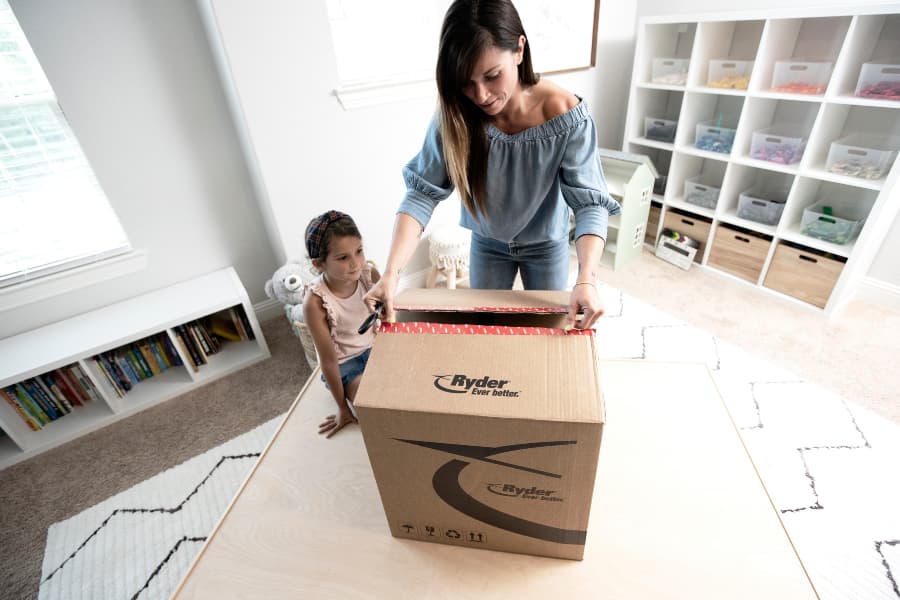Key Takeaways
- Proper temperature control in transportation and storage prevents spoilage, maintaining the freshness and safety of perishable goods like food and pharmaceuticals.
- AI, IoT, and sustainable practices are transforming cold chain logistics, improving route optimization, reducing energy consumption, and minimizing waste.
- Adhering to regulations like FSMA, HACCP, and GDP ensures that businesses meet safety standards, reducing the risk of contamination and protecting public health.
- With real-time monitoring, AI-powered route optimization, and predictive analytics, Ryder helps businesses maintain product integrity and streamline their cold chain operations.
Keeping perishable goods like food and pharmaceuticals fresh as you move them from your manufacturing plant to the end customer is challenging, but cold chain logistics can help. In short, cold chain logistics is a specialized and temperature-controlled storage and transportation method that preserves product quality.
Without proper temperature control, goods can spoil, leading to financial losses and health risks for customers. The process is complex, though, as fluctuating temperatures, delayed deliveries, and strict regulatory requirements can create challenges.
Fortunately, companies like Ryder provide innovative cold chain solutions leveraging real-time temperature tracking, AI-driven route optimization, and sustainable refrigeration technologies to ensure that perishable goods reach their destination safely.
Here's a look at the latest trends in cold chain logistics, the technology driving their improvements, and how advanced solutions from Rdyer can help businesses stay competitive.
Understanding Cold Chain Logistics
Cold chain logistics is the transporting and storing of perishable goods under carefully controlled temperature conditions. The simple goal is to maintain their quality and safety.
Unlike standard shipping, cold chain logistics requires specialized infrastructure like refrigerated trucks, temperature-controlled warehouses, and real-time monitoring systems. These systems are in place to check that products stay within safe temperature ranges throughout the supply chain.
Some industries where product quality and safety depend on consistent temperature control include:
- Food and Beverage Industry: Fresh produce, dairy products, meat, and seafood require precise temperature control to prevent spoilage and maintain taste and texture.
- Pharmaceutical Industry: Vaccines and medications must stay at specific temperatures to preserve their potency and protect patient safety.
- Floral Industry: Temperature and humidity changes can kill flowers, so they need controlled environments to maintain their freshness and appearance during transit.
The consequences can be costly and dangerous when cold chain logistics breaks down. Problems businesses can encounter include:
- Increased Spoilage and Waste: Perishable goods can quickly degrade if exposed to improper temperatures, leading to significant product loss.
- Foodborne Illnesses and Public Health Risks: Bacterial growth can accelerate in improperly stored food, increasing the risk of contamination and foodborne illnesses.
- Financial Losses: Product recalls, spoilage, and damage from failed cold chain processes can lead to financial setbacks and reputational harm for businesses.
Effective cold chain logistics keep perishable goods fresh and safe, reducing waste and improving customer satisfaction.
Cold Chain Logistics Trends for 2025
The demand for fresh goods is growing, and cold chain logistics is evolving to meet these challenges. In 2025, some advancements in technology and sustainability should improve efficiency, reduce costs, and minimize environmental impact.
For instance, artificial intelligence (AI) is transforming cold chain logistics by streamlining transportation: AI systems can analyze data from refrigerated trucks to predict mechanical issues before they happen, reducing breakdowns and keeping goods at safe temperatures.
AI-powered tools can also identify the fastest and most efficient delivery routes, accounting for traffic patterns, weather conditions, and delivery windows. This planning helps reduce fuel consumption, minimize delays, and maintain product freshness.
In addition, with growing environmental concerns, the industry is shifting toward more sustainable practices.
New refrigeration technologies use low-emission refrigerants, which reduce the carbon footprint while maintaining precise temperature control. Companies are going with electric and hybrid trucks for cold chain transportation, which also lowers fuel costs and greenhouse gas emissions.
The rising demand for frozen and refrigerated products is driving the need for increased storage capacity. As a result, companies are building and expanding cold storage facilities near major distribution centers to shorten delivery times and improve supply chain efficiency. More storage options allow businesses to handle seasonal demand spikes and reduce inventory loss.
Packaging technology is becoming more intelligent and more eco-friendly, as well. Sensors embedded in packaging can monitor temperature and humidity in real-time, alerting suppliers to any deviations that could compromise product quality. Eco-friendly packaging materials are also reducing environmental impact while maintaining proper insulation for temperature-sensitive goods.
These trends highlight how cold chain logistics is evolving to deliver better efficiency, sustainability, and product quality in 2025 and beyond.
Regulatory Compliance in Cold Chain Logistics
Compliance with industry regulations keeps products safe for human consumption. Regulatory bodies, including but not limited to the U.S. Food and Drug Administration (FDA), have strict guidelines to protect public health, reduce waste, and maintain product integrity throughout the supply chain.
Companies involved in cold chain logistics must follow these standards to avoid fines, product recalls, and reputational damage.
Key regulations include:
- FSMA (Food Safety Modernization Act): The FSMA, enacted by the FDA, requires companies to implement preventive measures to guarantee food safety during production, storage, and transportation. These measures include monitoring temperatures, maintaining clean facilities, and responding to potential contamination risks.
- HACCP (Hazard Analysis and Critical Control Points): HACCP is a globally recognized framework focused on identifying and controlling risks in the supply chain. It requires businesses to assess potential hazards like temperature fluctuations and establish corrective actions to prevent issues before they occur.
- GDP (Good Distribution Practices): GDP sets quality standards for storing and transporting pharmaceuticals and food products. It mandates proper handling, storage, and temperature control to preserve product integrity from the point of manufacture to the final delivery.
Ryder uses advanced technologies and best practices to meet and exceed regulatory requirements.
For example, the fleets at Ryder are equipped with IoT-enabled sensors that track temperature and humidity levels, sending automated alerts to address any issues that could lead to spoilage quickly.
Ryder also keeps detailed logs of temperature data, delivery times, and handling conditions, ensuring compliance with regulatory standards and streamlining the auditing process.
Ongoing training for drivers and warehouse staff is another key focus, helping everyone stay up to date with FSMA, HACCP, and GDP requirements. This ensures consistent handling and quality standards across the entire supply chain.
By prioritizing compliance, Ryder ensures perishable goods arrive safely and in optimal condition, reducing waste and safeguarding public health.
Temperature-Control Technology and Reporting
Advanced temperature-control technology keeps perishable goods at a safe temperature throughout the cold chain. Modern cold chain logistics relies on a combination of Internet of Things (IoT) devices, telematics, and blockchain to monitor and report temperature conditions.
This technology helps businesses prevent spoilage, meet regulatory requirements, and protect product quality from warehouse to delivery.
IoT and telematics systems contribute to cold chain logistics by providing visibility into the condition of perishable goods.
The idea is that sensors are placed in trucks, containers, and warehouses to monitor temperature and humidity levels. If the temperature moves outside the acceptable range, the system sends an alert, allowing drivers or logistics teams to take action before the product goes bad.
It's also worth noting that some perishable products require different storage conditions. Fortunately, multi-zone trucks are available and can maintain separate temperature levels within the same vehicle. This technology allows a single truck to accommodate various products, including frozen foods, dairy, and pharmaceuticals.
Beyond the trucks, you need your warehouses equipped with advanced HVAC systems and insulated storage units to store products at precise temperatures before shipment. The goal is to keep these products at a steady temperature until they reach the final customer.
Blockchain technology brings another layer of transparency and security to cold chain logistics, too.
This technology creates an immutable record of temperature readings and handling conditions, reducing the risk of data manipulation. Every stage of the cold chain is logged in the blockchain, giving businesses and regulators full traceability and accountability.
There's also the question of reporting and automated data collection, which simplifies compliance with FSMA, HACCP, and GDP requirements. Predictive data analysis helps identify potential problems before they escalate, allowing for quick corrective actions and reduced product loss.
Overall, integrating cutting-edge technology into cold chain logistics means businesses can improve efficiency and deliver perishable goods with greater confidence.
Cold Chain Logistics Solutions From Ryder
Ryder is a leader in cold chain logistics, providing advanced temperature-controlled transportation and storage solutions that help businesses preserve product quality and reduce waste. Ryder helps perishable goods reach their destination fresh and intact through real-time monitoring, AI-driven insights, and seamless coordination.
The fleets at Ryder are also equipped with state-of-the-art technology to maintain precise temperature control during transit. Every refrigerated truck at Ryder has IoT-enabled sensors that monitor temperature and humidity levels.
Our supply chain solutions also utilize AI-powered route optimization to adjust delivery routes based on traffic patterns, weather conditions, and delivery windows. This technology helps prevent delays, reduce fuel consumption, and maintain product freshness.
Ryder provides complete cold chain management, so products are correctly handled from start to finish.
The Ryder team manages every step of the process, from storage in climate-controlled warehouses to final delivery. Ryder also works closely with partners across the supply chain to minimize handling errors, reduce transit times, and maintain consistent temperatures.
In addition, Ryder uses AI and predictive analytics to enhance fleet reliability.
AI analyzes vehicle performance, weather conditions, and traffic patterns to optimize delivery routes and prevent mechanical failures. From there, predictive maintenance helps Ryder identify potential equipment problems before they cause breakdowns, reducing the risk of product spoilage.
An excellent example of Ryder helping a company with its cold chain logistics is visible through its partnership with Turkey Hill. Turkey Hill makes ice cream and refrigerated drinks, so temperature-controlled vehicles are a must.
For years, Turkey Hill operated a private fleet, but after growing to the point where the company was making 45 daily deliveries, upgrades became necessary. Ryder provided Turkey Hill with 80 trucks and 230 trailers, improving vehicle uptime and minimizing food loss.
These newer vehicles also save Turkey Hill about $150,000 in fuel costs each year while keeping their ice cream cold as they deliver to their customers.
Keep Your Perishables Fresh With Help From Ryder
Your perishable goods need cold chain logistics because temperature control helps prevent spoilage, reduce waste, and protect public health.
Ryder stands at the forefront of cold chain innovation, offering real-time temperature tracking, AI-driven route optimization, and comprehensive compliance support. Our end-to-end cold chain solutions transport and store products under ideal conditions, minimizing risk and maximizing product integrity.
With expertise and cutting-edge technology from Ryder, businesses can confidently navigate cold chain logistics and achieve long-term success.




